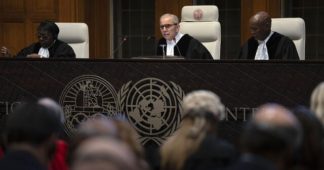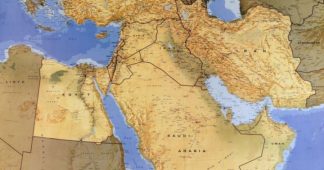By Marwan Emil Toubasi
In the historical and political context, since the escalation of the crimes of the Israeli occupation against our Palestinian people, the American administration claims that it is making great diplomatic efforts to stop the violence and achieve peace. In reality, American support for Israel’s policies and even political and military support formed part of the broader strategic partnership that aims to achieve “stability” in the Middle East from a new, old American point of view that relies on the principle of spreading democracy and stability through wars on the one hand, and promoting the idea of saving Israel. Israel on its own, according to the determinants of the existing strategic relationship between them, which I referred to in my previous articles, on the other hand, in order to create a suitable environment for the implementation of the new Middle East project, which began to be talked about a quarter of a century ago, and to strengthen the policies of illusion and deception that it follows under the pretext of the “honest mediator.” In “Conflict”Israeli Palestinian.
Causes and motives
In this context, the Biden administration seeks today, through the proposed three-stage initiative, to improve its international image through pressure to stop Israeli crimes in Gaza and “improve the humanitarian conditions.” After the two political regimes in Israel and the United States suffered from international isolation and standing in the cage of justice, which reflects their approach after the revelation… The issue of their image at all internal and international levels exposes the occupying state to various losses that it did not expect, the fragmentation of its society, and the threat to its stability.
Regional stability:
Stability in the Middle East, which is an important geopolitical region for the United States for multiple considerations, is considered a strategic priority for it with the aim of implementing its political and economic projects and programmes, especially today after its withdrawal from various conflict areas due to the damage it has suffered and in order to try to confront Chinese and Russian expansion in our region. Implementing projects to link Europe with Asia through roads, navigation and economics in accordance with the recommendations of the G20 summit in India last month. This is why the American administration is avoiding a greater escalation that might threaten its interests and the interests of its allies in the region. Therefore, achieving a sustainable truce according to what Biden presented in his language and method, citing the Israeli proposals, could contribute to achieving relative stability in this turbulent region from their point of view, and reducing the tensions in the region that it is essentially igniting.
Domestic politics and its international relations
Biden faces internal pressure from pressure groups and members of the Democratic Party, specifically from the progressive wing, who call for taking a hard-line stance towards Israel’s policies in the Palestinian territories, especially with Netanyahu’s call to deliver a speech before the US Congress. Meeting these demands strengthens political support for Biden within the United States. Also, there is a growing popular base within the United States, especially in universities, calling for the adoption of more balanced policies towards the Israeli-Palestinian conflict and the necessity of meeting the political rights of our people and reconsidering the relationship with the occupying state.
On the other hand, improving relations with Arab and Islamic countries is one of the priorities of the Biden administration. Pressure on Israel to stop the crimes committed may contribute to improving these relations, support the position of the United States in strengthening strategic alliances, and contribute to strengthening the economic and military security ambitions of the United States inRegion.
By implementing all of this, it seems that the Biden administration has become concerned with removing Netanyahu from his position and replacing the occupation government for the ease of passing its projects.
Challenges and possibilities
Despite the great efforts that Washington is engaged in, Biden’s success in ending the war on Gaza and achieving a sustainable calm initiative or stopping the war remains uncertain due to several complex factors:
1. The Israeli response:
From this side, although the initiative constitutes in its content the Israeli responses themselves, Netanyahu has maintained a strict position against any initiative that does not meet Israel’s “war” goals, which it has failed to achieve except through genocide and destruction. Netanyahu stressed that the primary goal is the complete dismantling of Hamas. He also criticized any ceasefire proposals that do not guarantee this goal, stressing that the “war” will continue until all of Israel’s security goals are achieved. Netanyahu also expressed his caution against transferring control of Gaza to the Palestinian National Authority, which he also seeks to obstruct. Acceptance or rejection of US initiatives by Netanyahu and other parties in the Israeli government plays a decisive role. If there are no Israeli willingness to make concessions, American efforts may face major difficulties. Historically, peace attempts have witnessed successes and failures that depend greatly on the political will of the leaders of the Israeli occupation, who are still intent on implementing the entire Zionist project in all of historic Palestine and reject the idea of peace between the two peoples.
2. The Palestinian position:
Acceptance or rejection by Palestinian resistance factions, especially Hamas, of American initiatives is another decisive factor. Without internal Palestinian consensus and popular support, the initiatives may be ineffective, as the Palestinian division between Hamas and Fatah since the coup in Gaza complicates matters, as the United States and regional powers must not object today to uniting the Palestinian ranks to facilitate any future negotiations with the Israelis, which is what It requires willA Palestinian National Association first. Although the Hamas movement expressed a cautious, positive reaction to the Biden initiative, especially with regard to proposals to increase humanitarian aid to Gaza, it expressed strong reservations about any post-war plans that exclude them from power or reduce their influence in Gaza. In my opinion, this is a matter that should not be dealt with from Hamas’s unilateral point of view in a way that does not serve its interest and the national interest, which today requires its joining the Palestine Liberation Organization, which has legal jurisdiction and international representative status, with the need to renew its vitality, activate its role, and achieve the participation of all national Palestinians within its frameworks, which have become one of theIt is necessary to invite it to a meeting so that the organization will then be able to face the challenges and impose its role in the upcoming negotiations.
3. International support:
The extent of support that the United States will receive from its European allies and Arab and Islamic countries will have a major impact on the course of this initiative launched by Biden. American efforts may have a better chance of success if they are supported by a broad international coalition. Support from the European Union, Arab and Islamic countries, as well as from the United Nations, could enhance the chances of success of the American initiative and increase pressure on the parties concerned to adhere to the proposed solutions.
4. Regional facts and variables
The situation in the region in general, including relations with Iran and its effects on Hamas and other resistance forces, and the situation in Lebanon, Syria, Iraq, and Yemen, are all factors that affect the possibility of achieving what the United States is working on. Regional tensions and the role of other players such as Iran and Turkey may further complicate the situation, which calls for more comprehensive strategies to deal with these facts and the interests of these roles.
5. Domestic politics in the United States
The extent of Congress and the American public’s support for Biden’s policies in the Middle East is important. Without strong support from within America, Biden’s efforts may be limited, in addition to the transformations in the American political scene, such as the ongoing demonstrations, disagreements in Congress, and the upcoming elections, which may affect Biden’s ability to implement his foreign policies in the near future.
The broader American vision
Biden’s initiative to achieve calm in Gaza reflects part of a broader American vision for the Middle East that includes:
1. Regional balance:
Maintaining the balance of power between major regional countries such as Saudi Arabia, Iran, and Turkey, to ensure that no party dominates the region in a way that threatens American interests, and strengthening strategic partnerships with the Gulf countries, Egypt, and Jordan is considered part of this vision.
2. American national security:
Protecting American interests in the region and maintaining its dominant role, including preventing the development of the ideology, culture, and form of resistance and ensuring the stable flow of oil and gas. Stability in the Middle East is considered necessary to achieve these goals, and strengthening security cooperation with the countries of the region under its supervision is considered one of its priorities.
3. Arab-Israeli normalization:
Continuing and strengthening the normalization process between Israel and the Arab countries that began with the Abraham Accords. The American administration seeks to expand these agreements to include other Arab and Islamic countries, which enhances regional security and stability from its point of view, in which it sees only part of the facts and half-things and the importance of Israel in integrating into this Middle East and even leading it. Today, the issue of Saudi-Israeli normalization is a priority for the United States, which is pressing in both directions in the face of Saudi Arabia’s adherence to establishing a Palestinian state before normalization is accomplished.
Ultimately, Biden’s success in ending the war of genocide on Gaza and imposing a “sustainable calm initiative” depends on the ability of the American administration to navigate these complex challenges, specifically dealing with the Netanyahu government, which is witnessing threats to overthrow it from religious Zionism on the one hand and the liberal Zionist opposition on the other. Other.
What the United States must realize today, after all that has happened and is taking place in terms of changes that do not accept the continuation of the mentality of settler colonialism, racial discrimination and siege, is the necessity of a radical change in American positions, something that may happen with more popular protests and the exposure of its interests to harm, and this is something that requires a clear Arab position in Her face. Ending the settlement occupation first on the basis of the territorial integrity of the Palestinian state is a basic condition for achieving stability in the Middle East.
This requires a comprehensive international strategy and coordination with all concerned parties to achieve it in accordance with international resolutions and international law, foremost among which is the implementation of the right to self-determination for our people, the establishment of its sovereign democratic state, and the implementation of a solution to the refugee issue in accordance with Resolution 194. Otherwise, the challenges and manifestations of Israeli fascist brutality remain great. Which our people will not accept or coexist with, while maintaining the right and legitimacy to resist it. But the hope of freedom, justice, and lasting peace deserves the continuous striving of all peoples to achieve it.
We remind our readers that publication of articles on our site does not mean that we agree with what is written. Our policy is to publish anything which we consider of interest, so as to assist our readers in forming their opinions. Sometimes we even publish articles with which we totally disagree, since we believe it is important for our readers to be informed on as wide a spectrum of views as possible.











